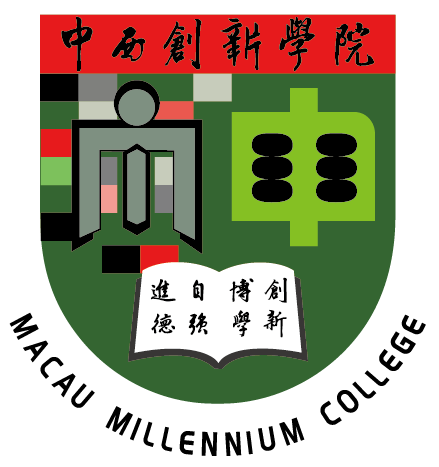Symposium on Higher Education Innovation in the Guangdong-Hong Kong-Macao Greater Bay Area Successfully Held in Hengqin, Guangdong
On 28 and 29 June, the Symposium on Higher Education Innovation in the Guangdong-Hong Kong-Macao Greater Bay Area was grandly held in the Guangdong-Macao In-Depth Cooperation Zone in Hengqin, Guangdong. The Symposium was co-hosted by the Guangdong Association of Higher Education and the Macao Association for Higher Education Development, with Macau Millennium College as the organiser and Guangdong University of Science and Technology and Huawei Technologies Co., Ltd. as co-organisers. The Symposium focused on the theme “Higher Education Innovation and Modern Industry Innovation”, discussing topics such as the mutual empowerment between higher education and modern industries, the integration of artificial intelligence (AI) and higher education, innovative practices of new research-oriented universities, and breaking down the barriers between industry and education to develop new productivity in the Greater Bay Area.

The Symposium was attended by prominent leaders and guests, including Professor Li Dasheng, Vice Chair of the Standing Committee of Guangdong Provincial People’s Congress and President of the Guangdong Association of Higher Education, Professor Song Yonghua, President of the Macao Association for Higher Education Development, Rector of the University of Macau and Fellow of the Royal Academy of Engineering, Professor Zhong Weihe, Rector of Macau Millennium College, Chair of the Board of Supervisors of the Macao Association for Higher Education Development, and Chancellor of Nanbo Education Group, Professors Liao Yi and Lu Xiaozhong, Executive Vice Presidents of the Guangdong Association of Higher Education, Professor Lionel Ni, President of the Hong Kong University of Science and Technology (Guangzhou), Professor Ouyang Qian, Party Secretary of Guangzhou University, Professor Jiang Hong, Party Secretary of Southern University of Science and Technology, Professor Zhao Wei, Fellow of the International Eurasian Academy of Sciences and Provost and Chair of the Academic Committee of Shenzhen University of Science and Technology, Professor Joshua Mok Ka-ho, Provost and Vice-President (Academic & Research) of The Hang Seng University of Hong Kong, Professor Zhou Wanlei, Vice Rector of the City University of Macau, Professor Zhao Weibing, Dean of the Faculty of Creative Tourism and Intelligent Technologies of Macao University of Tourism, Professor Lin Guangzhi, Director of the Institute for Social and Cultural Research of Macau University of Science and Technology, Professor Gong Gang, Director of Research Centre for Humanities in South China of the University of Macau, Dr Du Lan, International Chief AI Officer of the World Digital Technology Academy and Founding Chair of the Guangdong Association of Artificial Intelligence Industry, and Mr Zhao Yixin, Vice President of Huawei Public Utility Corps. More than 200 participants, including university leaders, heads of teaching and research departments, faculty representatives from within and outside the province, as well as representatives from relevant educational and research institutions, industry enterprises, and graduate students from related academic programmes, were also present. The event was hosted by Lu Xiaozhong and Zhong Weihe.
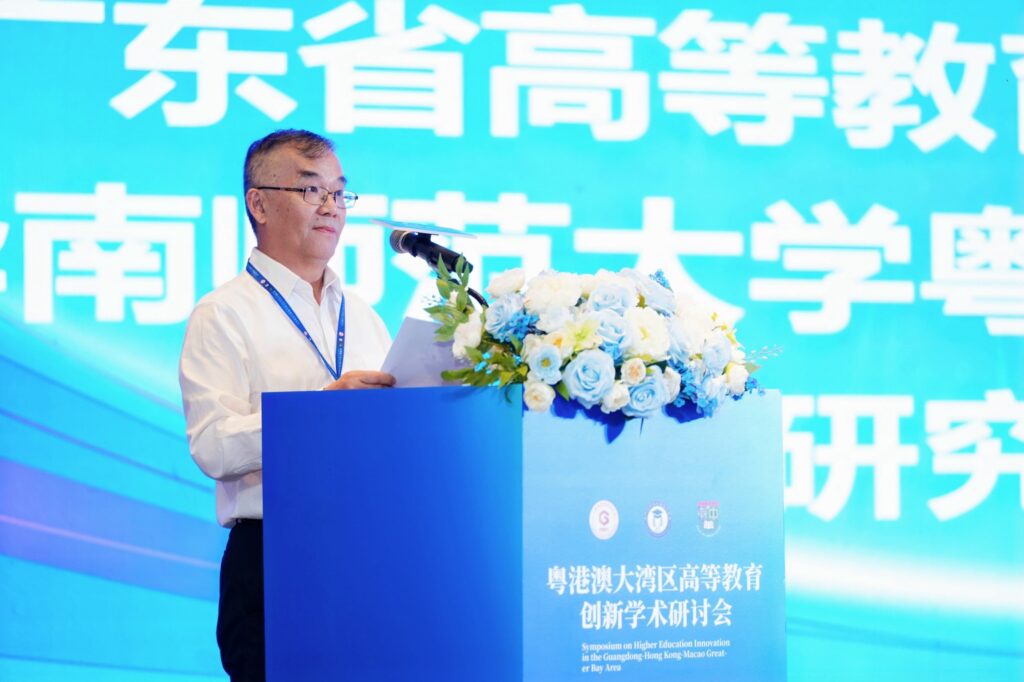
Lu Xiaozhong hosts the Symposium
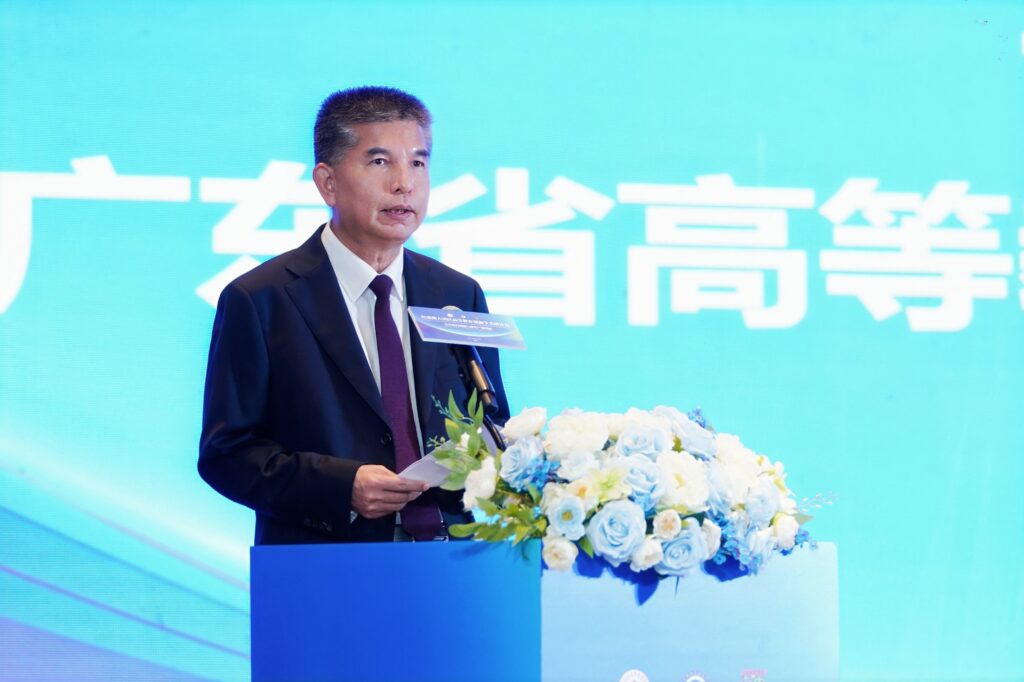
Professor Li Dasheng delivers a speech.
Professor Li Dasheng delivered a speech on behalf of the Guangdong Association of Higher Education. He pointed out that the Symposium thoroughly implements important policies such as the Outline Development Plan for the Guangdong-Hong Kong-Macao Greater Bay Area, the National Education Conference, and the Outline of the Plan for the Construction of China into an Education Powerhouse (2024-2035). Experts and scholars from Guangdong, Hong Kong, and Macao, as well as representatives from mainland universities and enterprises, were invited to focus on national strategies and the Greater Bay Area’s development positioning. The Symposium explored topics such as aligning university disciplinary development with industrial demands in the Greater Bay Area, AI-enabled talent cultivation pathways, and the integration of humanities and modern industries, answering the mission of higher education in this era. He emphasised that the new round of technological revolution and emerging industries require higher education to meet higher standards, and that the deep integration of higher education and modern industries is key to driving social progress and enhancing the nation’s core competitiveness. As a major national strategic deployment, the Guangdong-Hong Kong-Macao Greater Bay Area (the “Greater Bay Area”) has rich university resources and distinctive industrial features. It has world-class research capabilities and rapidly developing high-tech industry clusters. He held that the innovative development of higher education not only relies on changes in education models but also on close integration with industry development. He further stated that universities should build a collaborative innovation mechanism at the core, promote the mutual empowerment between higher education and modern industries, and use AI as the main focus to lead the digital transformation and innovation of higher education, fostering innovative talents and new productivity in the Greater Bay Area. He expressed the hope that universities, enterprises, and research institutions in Guangdong, Hong Kong, and Macao will break down geographical, institutional, and disciplinary barriers, jointly build industry-university-research cooperation platforms, achieve a precise alignment between educational supply and industry demand, and form a positive cycle where education supports industry, and industry nourishes education, creating a talent cultivation system and technological innovation system aimed at solving major industrial issues.
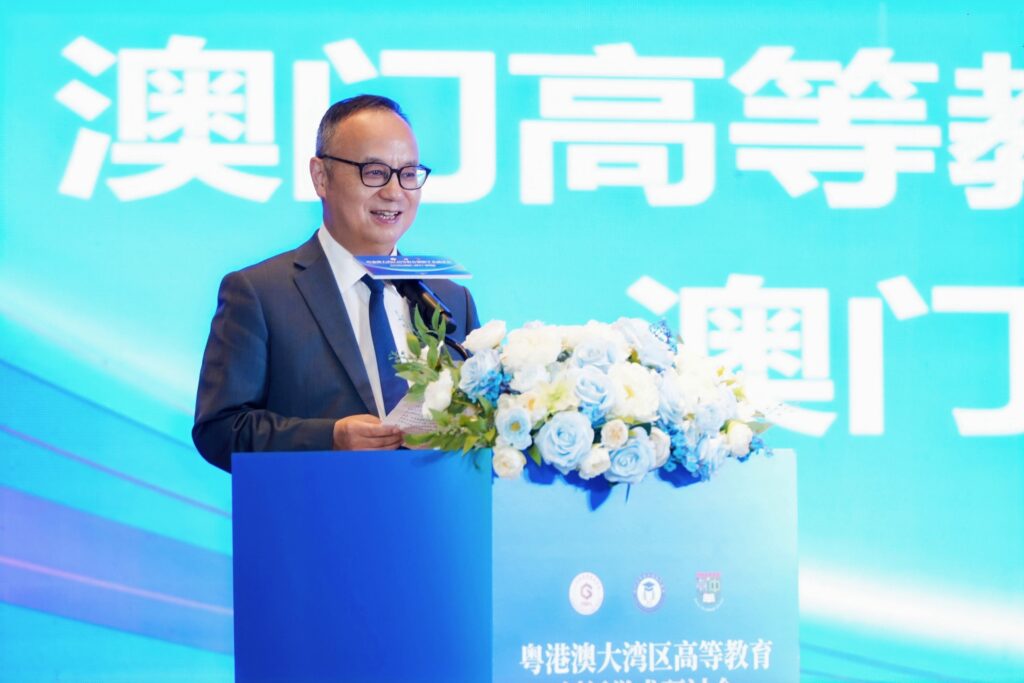
Professor Song Yonghua delivers a speech and presents a keynote report.
Professor Song Yonghua delivered a speech on behalf of the Macao Association for Higher Education Development. He emphasised that higher education innovation in the Greater Bay Area carries a threefold mission, namely, driving the development of new productivity, promoting regional collaboration, and enhancing international competitiveness. He pointed out that innovation in higher education is a core strategy concerning national competitiveness and regional development vitality, and that as an important member of the Greater Bay Area, Macao should fully leverage its unique advantages of “One Country, Two Systems” and the “China-Portuguese-speaking Countries Platform” to take the lead in making breakthroughs in areas such as constructing a collaborative higher education mechanism in the Greater Bay Area, deepening the integration of industry and education, and exploring innovative development pathways, thus providing a demonstration for the innovative development of higher education in the Greater Bay Area. In his keynote report titled Exploration and Practice of Integrated Development of Education, Technology, and Talent in the Guangdong-Hong Kong-Macao Greater Bay Area under the Background of Building a Strong Education Nation, he thoroughly analysed the symbiotic relationship between regions and universities under the strategy of a strong country in education, sharing the development vision of the University of Macau to position itself as a university with firm roots in Macao, while at the same time being committed to participating in the development of the Greater Bay Area, integrating itself into national development, and reaching out to the world, and introduced practical pathways such as university-enterprise cooperation and the expansion of educational services. At the same time, using the modernisation of traditional Chinese medicine as an example, he vividly demonstrated the practical achievements of the University of Macau in talent cultivation, academic research, and industry-university-research cooperation across the full chain, highlighting its active contributions to the construction of an international education demonstration zone and innovation centre in the Greater Bay Area.
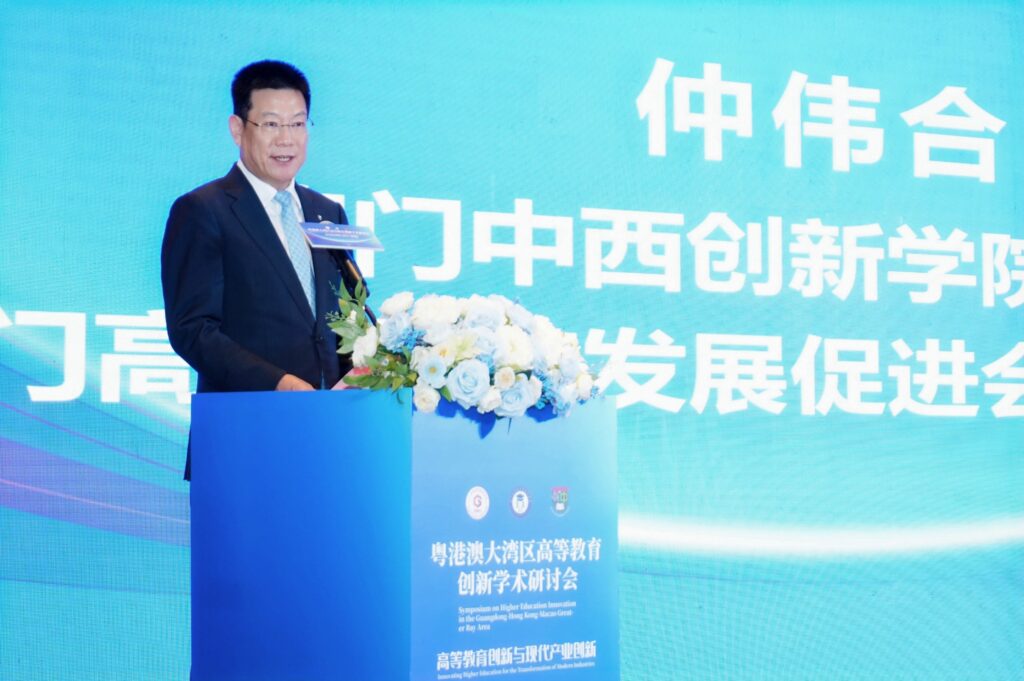
Professor Zhong Weihe delivers a speech.
Professor Zhong Weihe delivered a speech on behalf of the organisers of the Symposium. He pointed out that the development of the Greater Bay Area cannot be separated from the support of higher education and the cross-regional flow of talent, and that higher education needs to transform from a “knowledge producer” to an “innovation ecosystem builder”, deeply integrating with the industrial chain, innovation chain, and talent chain to achieve dual empowerment. He proposed that to achieve cross-boundary integration and institutional innovation, efforts should be focused on three aspects: First, reconstruct the education model, promote the integration of AI with higher education, and emphasise cultivating critical thinking and creativity; second, build a new type of research-oriented university, construct a collaborative innovation system, and integrate the entire chain of innovation outcome transformation; third, break down institutional barriers and build a collaborative education framework and an integrated higher education community in the Greater Bay Area. In addition, he introduced Macao Millennium College’s practice of constructing a “Digital+” educational ecosystem strategy, developing related degree programmes, recruiting postdoctoral research fellows, and Nanbo Education Group’s development of a full-chain talent cultivation supply system.
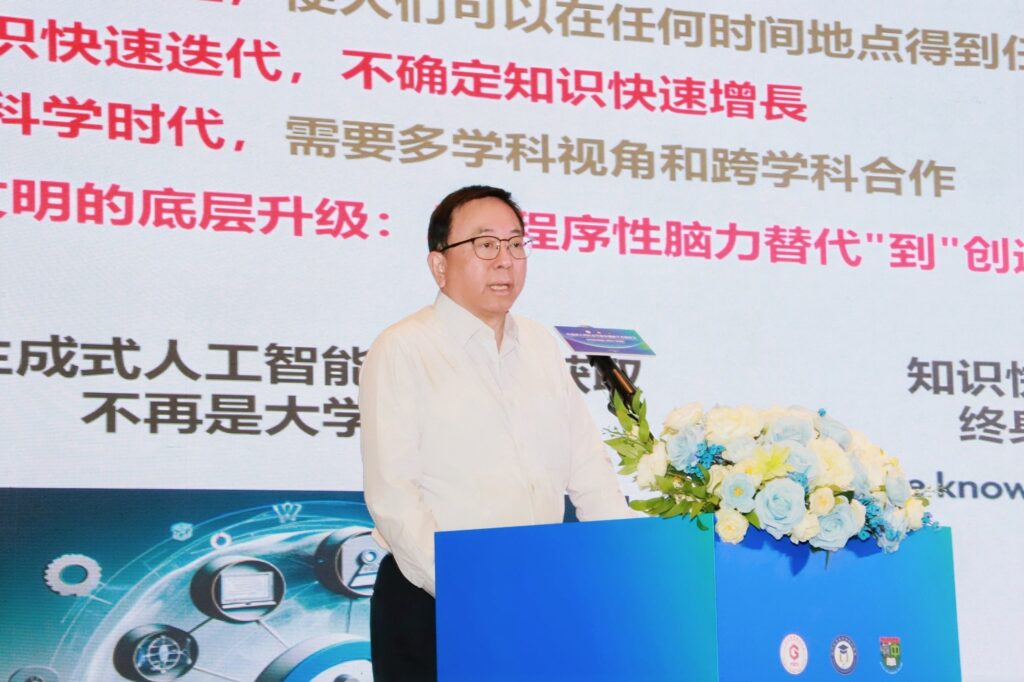
Professor Lionel Ni delivers the keynote report.
Professor Lionel Ni presented the keynote report titled From Knowledge Reservoir to Value Creation: Ecological Reconstruction of Innovative Talent Cultivation in the AI Era. He discussed the learning objectives, content, and methods in higher education in the new knowledge era, proposing an innovative talent cultivation ecosystem centred on meta-competence development, interdisciplinary construction, and the holistic development of students. Furthermore, he introduced the practices of The Hong Kong University of Science and Technology (Guangzhou), sharing how the university uses the Guangdong-Hong Kong integration model, the “three integrations and one transformation” approach, and project-based exploratory maker education to promote the transformation of education from knowledge transmission to value creation, providing an innovative example for talent cultivation in new research-oriented universities in the AI era.
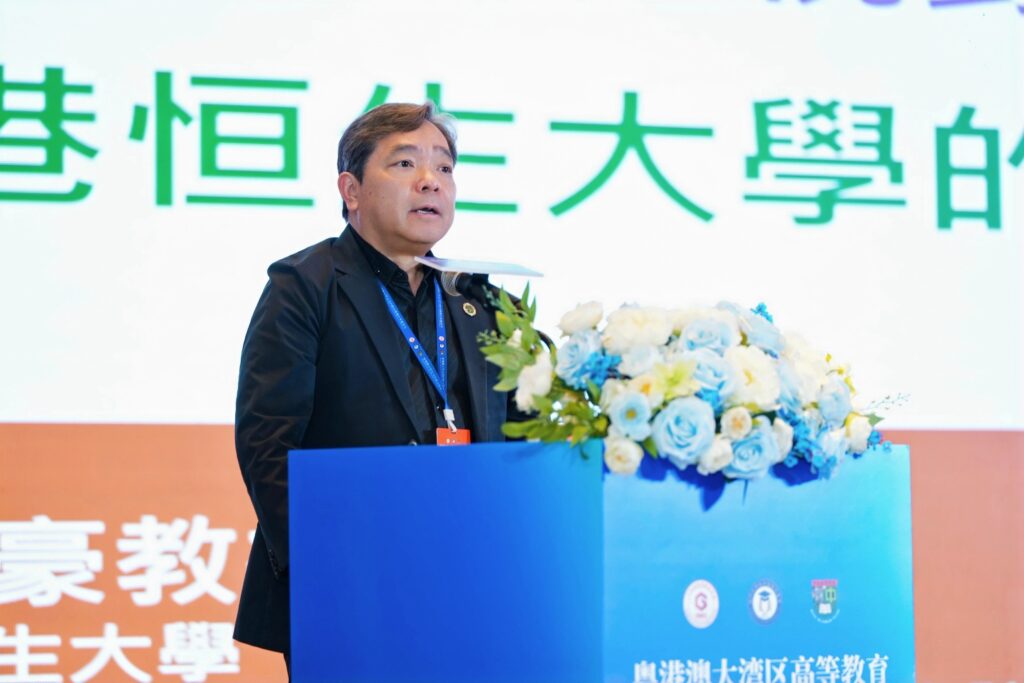
Professor Joshua Mok Ka-ho delivers a keynote report.
In his keynote report titled Cultivating Talents with a Global Vision and Humanistic Care: The Experience of The Hang Seng University of Hong Kong, Professor Joshua Mok Ka-ho deeply analysed the university’s “Liberal + Professional” education model, explaining the concept of cultivating “Talents with a Global Vision and Humanistic Care”, and shared the practice of integrating interdisciplinary learning and holistic development in student education.
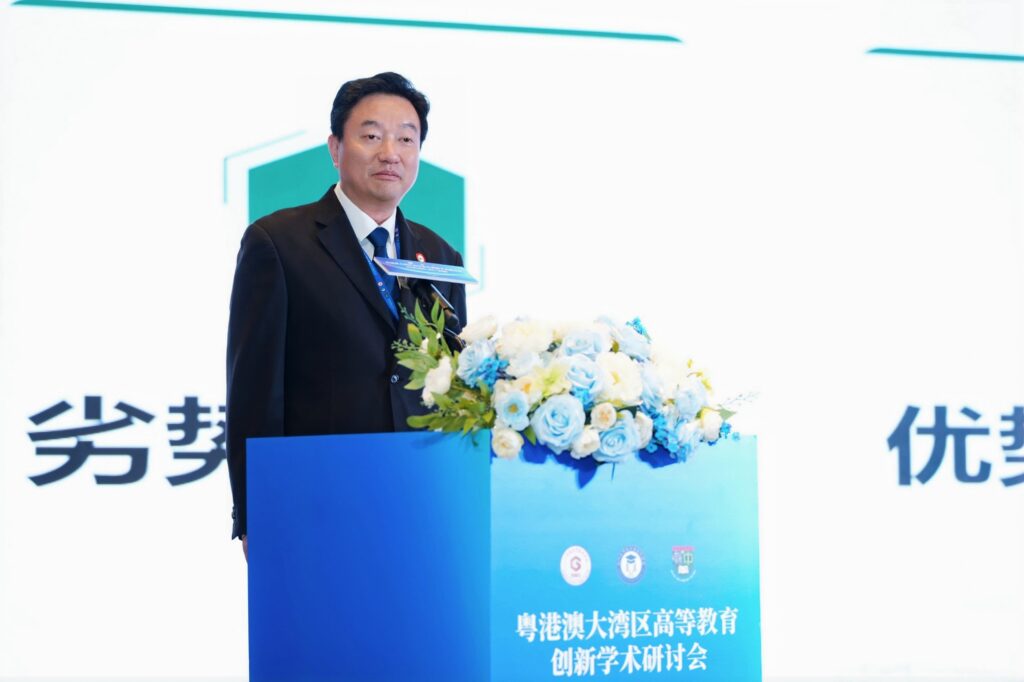
Professor Ouyang Qian delivers a keynote report.
Professor Ouyang Qian delivered the keynote report titled Exploring the Path of Innovation and Development for Comprehensive Urban Universities. Focusing on Guangzhou University’s mission of “Rooted in Guangzhou, Serving the Bay Area”, he deeply analysed the opportunities and challenges in the development of comprehensive urban universities. He proposed that comprehensive urban universities should closely align with urban development needs, optimise resource allocation, deepen reform and innovation, and strengthen international cooperation to achieve synergy with urban development and mutual empowerment, thus providing strong support for regional construction and national strategic implementation.
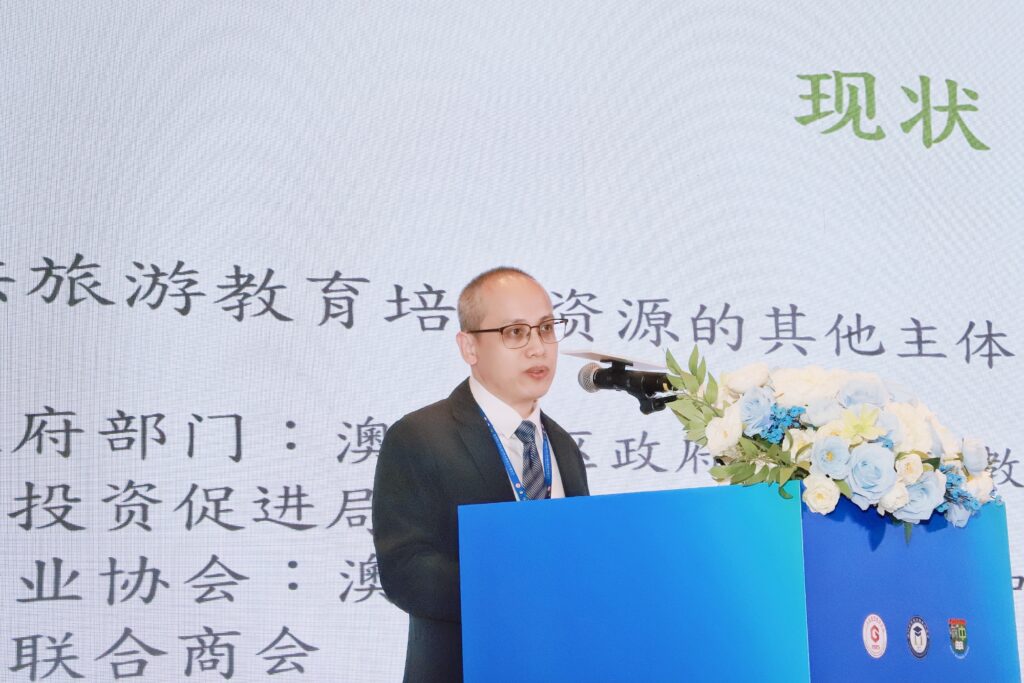
Professor Zhao Weibing delivers a keynote report.
In his keynote report titled International Educational Cooperation to Promote High-Quality Development of the Tourism Industry in the Guangdong-Hong Kong-Macao Greater Bay Area, Professor Zhao Weibing shared the practical experience of the Macao University of Tourism. The university, leveraging its strengths in tourism education, has built a dual-track system of “academic education + vocational training” and developed a talent cultivation model that combines theory and practice with clear international characteristics by offering tourism-related degree programmes. At the same time, it actively promotes the Macao Occupational Skills Recognition Standard (MORS), ensuring a precise alignment between talent cultivation standards and industry needs, providing talent support for the high-quality development of the tourism industry in the Greater Bay Area, and exploring new pathways for the development of new productivity.
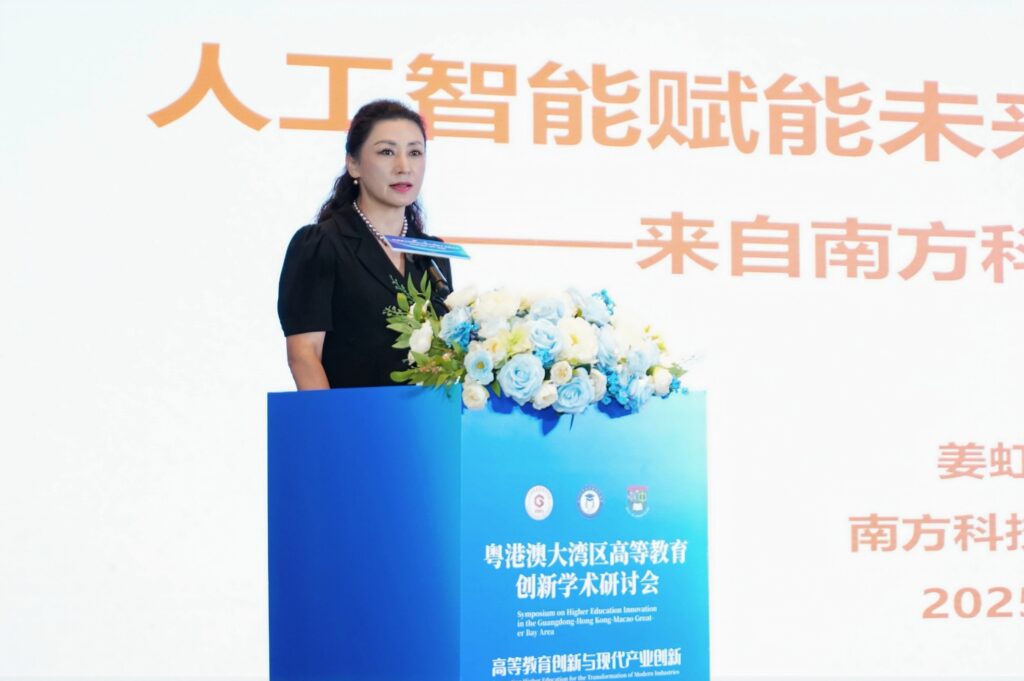
Professor Jiang Hong delivers a keynote report.
In her keynote report titled A Few Thoughts on AI-Enabled Future Education, Professor Jiang Hong deeply analysed the core implications of future education in the age of AI, compared the policies and practical achievements of AI-enabled education both domestically and internationally, and proposed innovation paths and exploration directions for future education. At the same time, she combined the practical experience of Southern University of Science and Technology in AI general education curriculum development, research platform building, and new engineering talent cultivation, offering a systematic plan and demonstration experience for building a human-centred intelligent educational ecosystem and advancing the digital transformation of education.
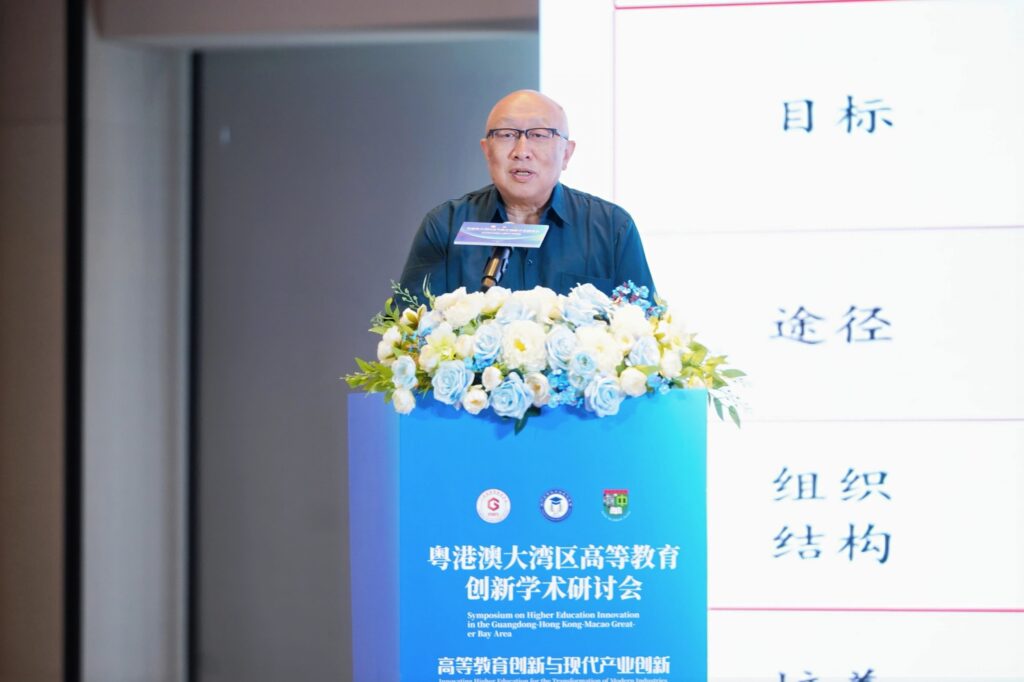
Professor Zhao Wei delivers a keynote report.
Professor Zhao Wei delivered the keynote report titled The Evolution of Universities and the Practices of Shenzhen University of Science and Technology. He systematically reviewed the development process of universities from the traditional “Ivory Tower Model” to new research-oriented universities. He pointed out that new research-oriented universities must strengthen their social mission and service to national strategies while pursuing academic excellence, with a focus on interdisciplinary integration and open education to maximise their social value. He shared Shenzhen University of Science and Technology’s practices in breaking down departmental barriers with its modular design, the establishment of interdisciplinary “Six-in-One” colleges, and the “Three-Colleges-in-One” talent cultivation model, providing practical references for the innovative development of new research-oriented universities.
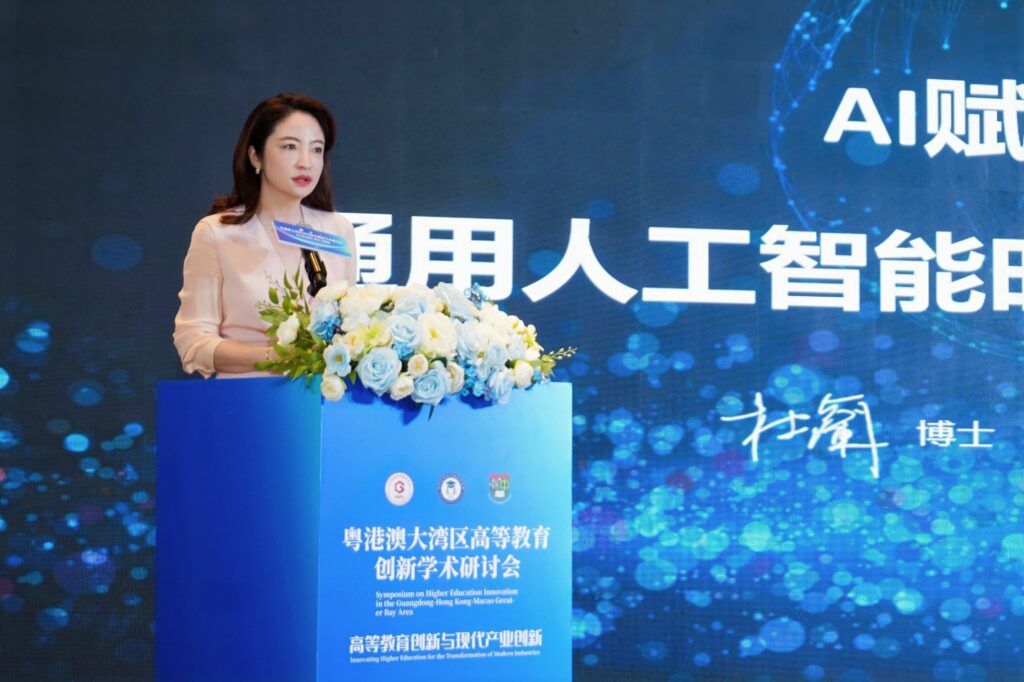
Dr Du Lan delivers a keynote report.
Dr Du Lan delivered the keynote report titled AI-Enabled Higher Education: Opportunities and Challenges of General AI. She started by examining major technological breakthroughs in the field of AI, outlining the development trajectory from computation and perception to cognitive intelligence, and revealing trends in large model technology and its applications. She deeply analysed the transformation of education enabled by AI, pointing out four core challenges: academic integrity, knowledge accuracy, educational fairness, and disciplinary bias. She emphasised the need to leverage human uniqueness to guide technological development and create an educational ecosystem where humans and AI collaborate.
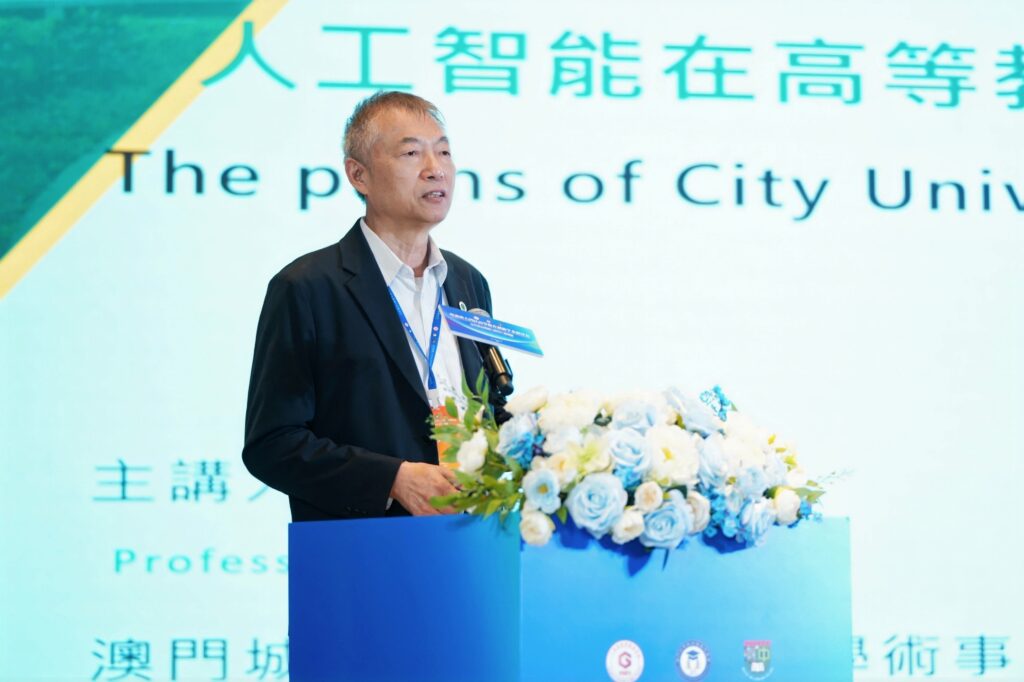
Professor Zhou Wanlei delivers a keynote report.
Professor Zhou Wanlei delivered the keynote report titled Attempts at AI in Higher Education: A Case Study of City University of Macau. Using City University of Macau’s transformation from a teaching-oriented to a teaching- and research-oriented institution as a backdrop, he explained the practical path for integrating AI into higher education, showcasing the exploration of how liberal arts-focused universities promote the deep integration of AI with education, providing a practical exploration of the digital transformation of higher education in Macao.
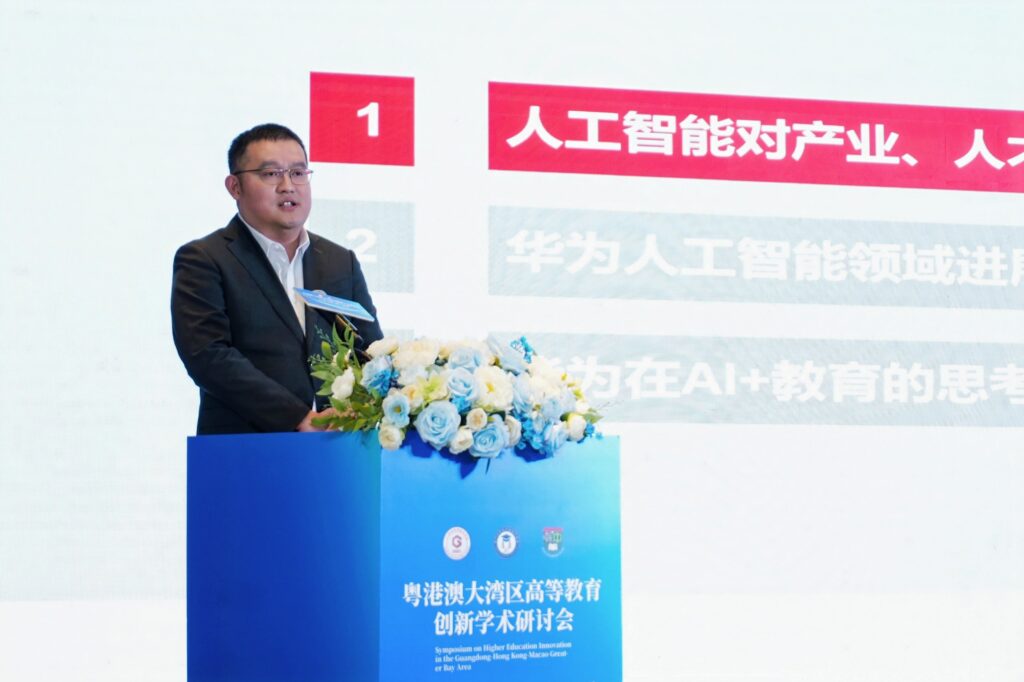
Professor Zhao Yixin delivers a keynote report.
In his keynote report titled AI-Enabled Innovation in Higher Education Development, Professor Zhao Yixin deeply analysed the transformative impact of AI on industry, talent, and education. He introduced Huawei’s practical applications of the DeepSeek large model and Ascend computing platform in the education field, proposing thoughts and suggestions on “AI + Education” to provide technological support and solutions for the digital transformation of education and the cultivation of innovative talents suited for the intelligent economy.
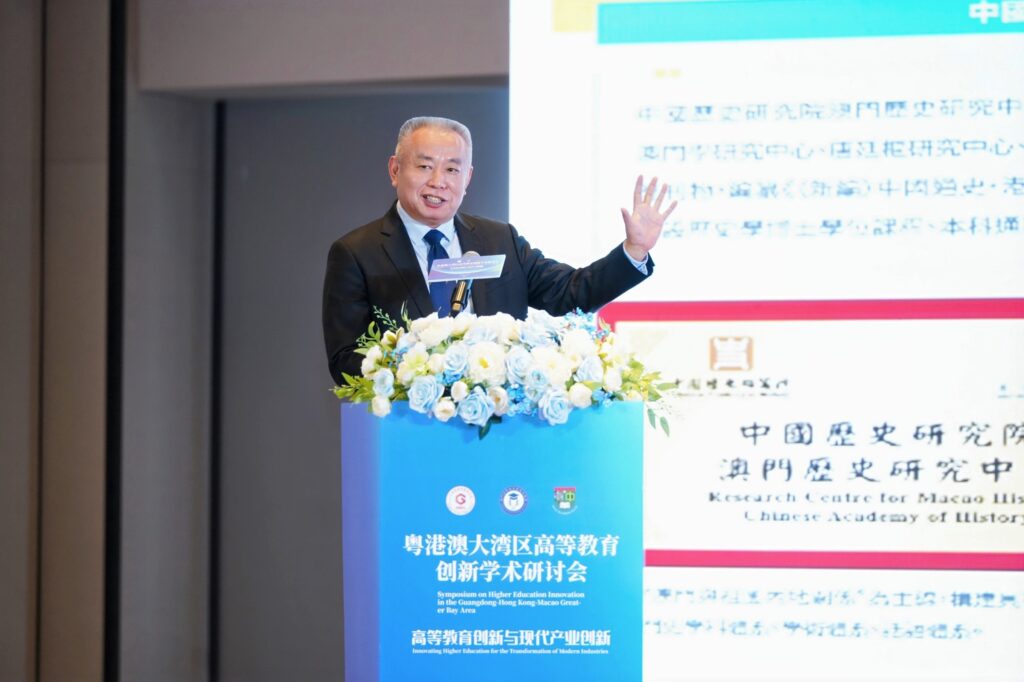
Professor Lin Guangzhi delivers a keynote report.
In his report titled Practice and Reflection on the Bidirectional Empowerment of Humanities, Social Sciences, and Modern Industry, Professor Lin Guangzhi used the example of the Macau University of Science and Technology’s “History+ ” interdisciplinary construction to explain the empowering role of historical research in industrial development, and the feedback effect of industry demands on academic research and talent cultivation, creating a teaching, research, and industry-academic system with “goals, teams, curricula, platforms, networks, and bases”.
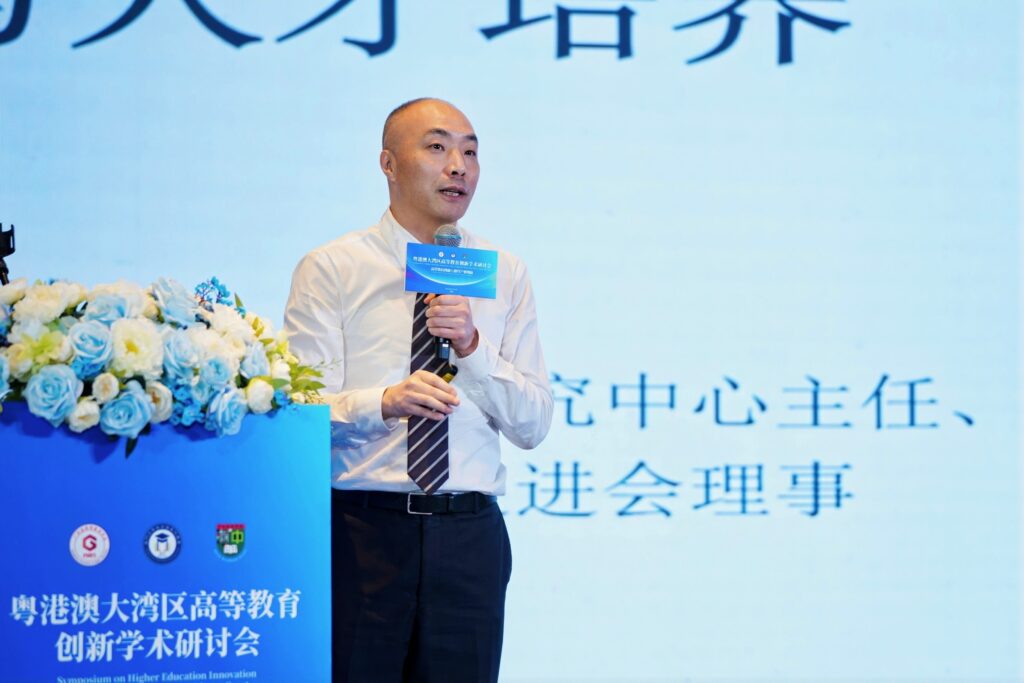
Professor Gong Gang delivers a keynote report.
Professor Gong Gang delivered the keynote report titled Humanities Education and Talent Cultivation in the Digital Era. Starting with the origins of digital humanities and the symbiosis of philosophy and science, he explored the collision of virtual and real cosmology between the East and the West. He proposed that education in the digital era must maintain reflection on computational rationality and algorithmic philosophy, presenting and reflecting on digital existence poetically through poetics, and raising cognitive boundaries to better face, interpret, and guide the new era of digital existence and humanity.
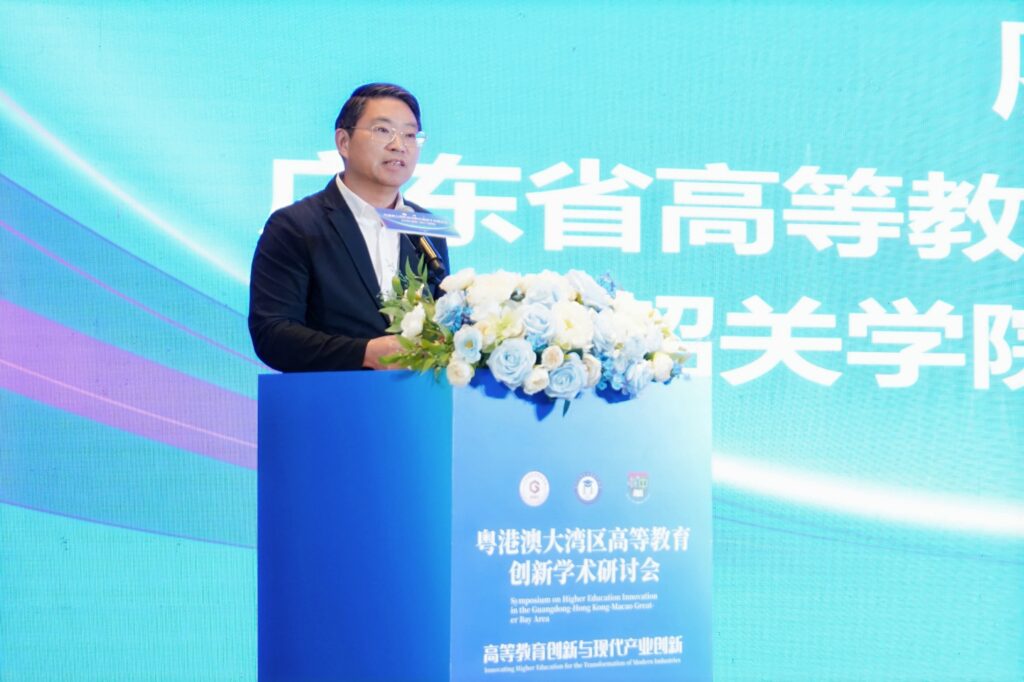
Professor Liao Yi delivers the summary speech.
At the end of the Symposium, Professor Liao Yi delivered the summary speech. He pointed out that holding the Symposium in Hengqin has symbolic significance, bringing together the wisdom of Guangdong, Hong Kong, and Macao, and establishing a high-level platform for intellectual exchange, academic communication, and sharing of achievements. This provides important practical references for deepening the integration of industry and education in universities in the Greater Bay Area, optimising talent cultivation models, and offering theoretical and practical support for fostering new productivity in the region, thus advancing the higher education sector in the Greater Bay Area to new heights. He stated that the Guangdong Association of Higher Education will continue to build academic exchange and cooperation platforms in the future, enhancing its ability to serve universities within the province and the higher education sector in the Greater Bay Area, and contribute more wisdom and strength to the construction of a strong nation in eduction through Guangdong-Hong Kong-Macao collaborative innovation.
On 29 June, the participants visited BYHEALTH’s Industry-University-Research Cooperation Base in Zhuhai. BYHEALTH was founded in 1995, listed on the Shenzhen Stock Exchange’s Growth Enterprise Market in 2010, and transformed into a high-tech enterprise in 2022. It now serves as a production base for dietary nutritional supplements known for advanced technology and stringent quality control. The participants visited the unmanned warehouse and transparent factory, observing the AI-driven intelligent production processes and rigorous quality control systems, which has significant meaning for promoting the integration of higher education with modern industries and facilitating the organic connection between the education chain and the industry chain.

